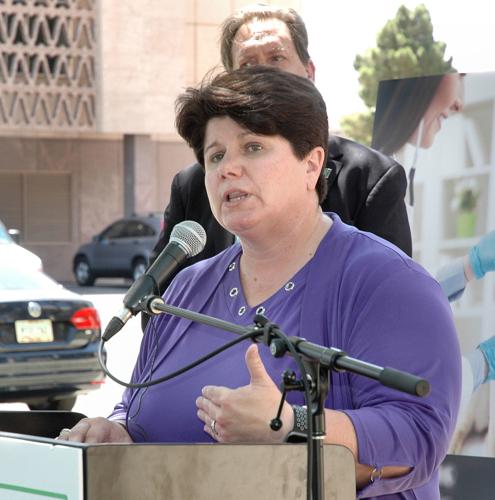PHOENIX — Realtors formally launched their bid to have voters bar Arizona lawmakers from ever taxing services, even if legislators also reduced or eliminated taxes on other necessities or said the state needed the revenues.
The Arizona Association of Realtors submitted more than 400,000 signatures Tuesday on petitions to put a measure on the November ballot to constitutionally prohibit a state sales tax on services. It would cover everything from their own services to medical care, barbers, lobbying services and weight-loss centers.
The desire is to protect senior citizens and the poor from new taxes that a future legislature might impose, said Holly Mabery, a Prescott real estate agent who chairs the effort.
But Mabery didn’t dispute that the ballot measure, if approved, would prevent lawmakers from revamping taxes in a way that might actually have more benefit to people on fixed incomes.
For example, Arizonans now pay taxes to purchase school supplies, clothing, over-the-counter medications and adult diapers. Under current law, lawmakers could opt to make those purchases tax-exempt, making up any lost revenues by taxing selected services.
Or they could expand the list of what’s taxable to include services and reduce the overall state sales tax rate from its current 5.6 percent.
This initiative would block lawmakers from taxing not just basic services like medical care but also accounting, advertising, public relations, travel arrangements, nail salons, portfolio management and investment advice.
“The way we look at it, we want to draw a line in the sand that will absolutely protect Arizona taxpayers,” Mabery said.
Asked about the taxes now imposed on items routinely purchased by the poor and the elderly, she responded, “That’s not what we’re talking about.”
House Speaker J.D. Mesnard, R-Chandler, said Tuesday that, from a policy standpoint, he’s never been a fan of sales taxes on services. But it’s not that simple, he added.
“From a philosophical standpoint on how government should be run, I tend to believe that public officials need the flexibility to govern,” Mesnard said. “So putting restrictions on their ability isn’t helpful.”
Sen. David Farnsworth, R-Mesa, who chairs the Senate Finance Committee, has no such second thoughts, however.
“Taxes go up, up, up and government services are expanded tremendously,” he said. Farnsworth said he believes it is important to restrain the ability of lawmakers to raise any new taxes “since I consider socialism to be the real enemy of our country.”
Mabery said there’s no guarantee that any action by Arizona lawmakers would be revenue-neutral, having new taxes on services replace the levy on certain products. She said the initiative also protects against adding services to the list of what’s taxable to generate more dollars.
“Just this year the state of Illinois discussed taxing services,” she said. “And other states like North Carolina, Washington, and most recently Oklahoma, have all passed a tax on services.”
Mabery there are politicians in Arizona who have said they want to produce more revenues by expanding the list of what’s taxable.
That includes state Sen. Steve Farley, D-Tucson, who now is running for governor. Farley has pushed to expand what’s taxable to generate funding for education. Fellow Democrat David Garcia, also in the gubernatorial hunt, also has said the state needs to review what is now exempt from sales taxes.
Republican gubernatorial hopeful Ken Bennett also has mentioned the idea of taxing services, but in the context of making the state less dependent on income taxes.
There already are some constraints on the ability of lawmakers to raise taxes.
A 1992 state constitutional amendment requires a politically difficult two-thirds vote of both the House and Senate for anything that increases state revenues. That applies to any tax increase, including a new one on services, that does not include a commensurate decrease in other taxes.
At a news conference, Mabery was asked whether it is good policy to remove that ability of two-thirds of the Legislature to impose taxes on services as an option to maintain state services in times of economic distress.
“What we see is that amending the Constitution will actually protect Arizona’s economy by giving it sustainability,” she responded. “If there is inconsistency in our economy, that’s usually where we see small business pack up and move out. And that destabilizes our economy.”
The measure will be on the ballot if the Secretary of State’s Office determines that at least 225,963 of the signatures are valid.





